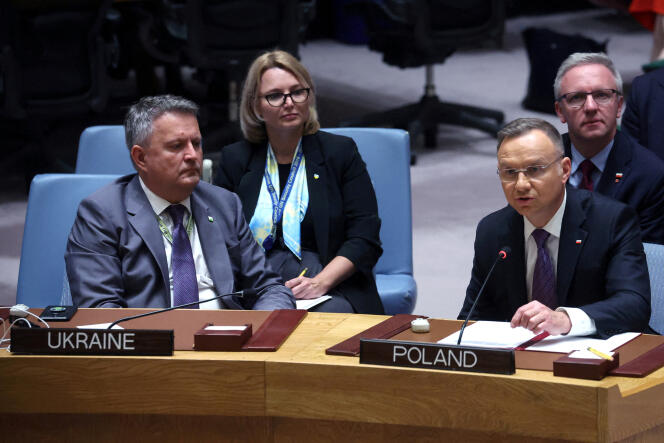


Is this a sign of anxiety within the Polish government ahead of the general election on October 15, or a real threat of a rift between Kyiv and Warsaw, its staunchest European ally? On Wednesday, September 20, Prime Minister Mateusz Morawiecki's announcement that Poland would be halting the delivery of weapons to Ukraine sent shockwaves through European capitals. Proof that the crisis may be deep-rooted, Brussels officials on Thursday attempted to engage in damage control, while the Ukrainian government announced its intention to negotiate a solution to the grain dispute.
The fire has been smoldering for some months now but in the last few days the issue has flared up. The decision by Poland, Hungary and Slovakia on September 15 to extend the embargo on Ukrainian grain, against the European Commission's decision to end the special rules introduced in the spring at the request of the three countries, has escalated the dispute with Kyiv.
Ukraine's determination to take the matter to the World Trade Organization (WTO) has widened the gulf even further. Without actually being named, Poland was the first to feel that Volodymyr Zelensky was pointing the finger in his speech to the UN on Tuesday: "It is alarming to see how some in Europe, some of our friends in Europe, play out solidarity in a political theater (...) in fact they are helping set the stage to a Moscow actor."
The subject of the dispute and how it is being dealt with are not being taken lightly. "It's a pity that the Ukrainians have chosen to take the dispute to the UN and the WTO instead of settling it within the European family," said one European diplomat. Ukrainian politician Volodymyr Fesenko thinks the Ukrainian president is an "enfant terrible" who knows nothing of diplomatic practices on the continent: "Zelensky has shifted the paradigm of relations with Western chancelleries. He's not a player, more an independent actor, a more active subject. What's more, many in the West don't like this and criticize him for being shameless."
According to former NATO Assistant Secretary General Camille Grand, "Zelensky's unfiltered questioning of Poland, one of his staunchest allies in Europe, is reminiscent of his outburst against the United States at the NATO summit in Vilnius. When the United States refused to offer any clear prospect of joining the defense organization, he immediately expressed his frustration. It's almost like his trademark."
For Mykola Kniazhytskyi, MP for the European Solidarity party (of former Ukrainian President Petro Poroshenko), the surge in Ukrainian-Polish tensions can be explained by the overly personalized bilateral relationship between the Ukrainian president and his Polish counterpart, Andrzej Duda. "The day before yesterday, Zelensky and Duda were the best of friends, and yesterday they canceled a meeting at the UN General Assembly. From now on, all responsibility for the failure of Polish diplomacy will fall on the President alone."
You have 46.72% of this article left to read. The rest is for subscribers only.
